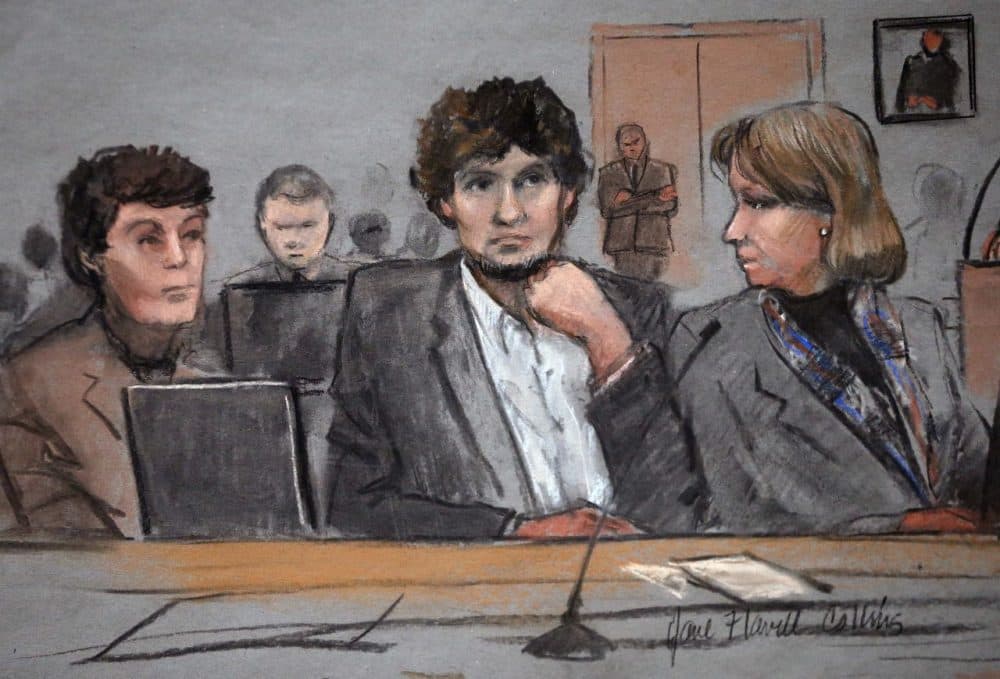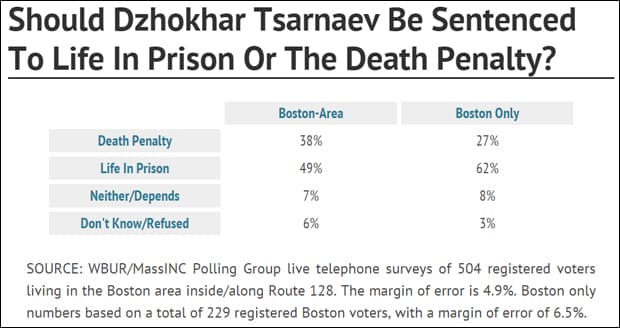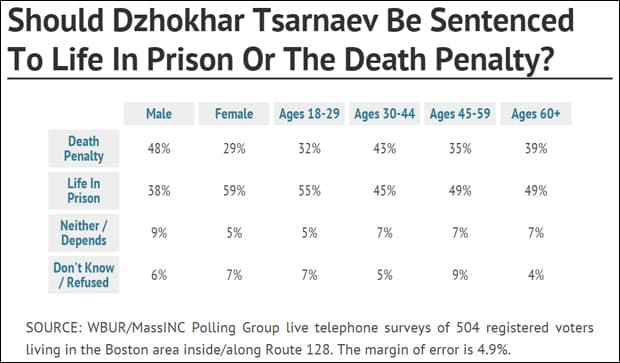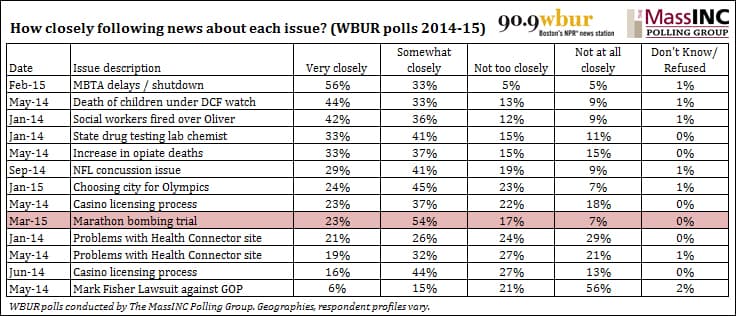Advertisement
WBUR Poll: Most In Boston Think Tsarnaev Should Get Life In Prison Over Death Penalty

As the trial of Dzhokhar Tsarnaev moves ahead, a new WBUR poll (topline, crosstabs) finds most Boston residents believe the admitted Boston Marathon bomber should receive life in prison instead of the death penalty if convicted.
In a survey of 229 registered Boston voters, 62 percent said Tsarnaev should be sentenced to life in prison without the possibility of parole, while 27 percent said he should receive the death penalty.
That preference held true for the broader Boston area, defined as communities inside and along Route 128 — but the margin is slimmer. Of 504 registered Boston area voters surveyed by telephone March 16-18, 49 percent think Tsarnaev should get life in prison, while 38 percent feel he should be sentenced to death.

"Generally speaking, you'd expect the city of Boston to be anti-death penalty, but this took place in Boston and everybody in Boston was affected in some way," said Steve Koczela of The MassINC Polling Group, which conducted the poll. "To see such a strong preference in Boston for life in prison was not necessarily guaranteed or expected."
Koczela said since Boston tends to be more liberal and Democratic — a political position that tends to oppose the death penalty — the poll essentially shows people's beliefs being put to the test.
Poll respondent Siri Kyle Dupont-Hurley, 25, of Dorchester said she is generally against the death penalty and considers it "a pretty easy out."
"I don’t support taking lives for the sake of taking lives and I also think it’s a much more fitting punishment for someone who did the things that he did to live out his final days in prison," said Dupont-Hurley, who does marketing for an equestrian company.
Some respondents had other reasons for why they believe Tsarnaev should get life in prison.
"I think he was influenced by his brother," said poll respondent Angela Hoskins, 48, of Mattapan, who also added that his age and immaturity were other factors for her position.
Hoskins, a mental health counselor, considers the death penalty a wrong for a wrong.
"We're going to hold accountable people for taking lives, but yet the way we hold them accountable is by taking their life?" she said.
Others, however, see the death penalty as an appropriate punishment for heinous crimes. Poll respondent Don Portalla, 52, of East Boston said he thinks the death penalty also serves as a deterrent.
"If you don’t have the death penalty [in this case], I think it’s a huge mistake," Portalla said. "We can’t have people acting like this."
Advertisement
Across different demographics, the preference for punishment varied a bit more.
Men were more in favor of the death penalty in this case than life in prison, while women more strongly favored life in prison over the death penalty. Across all age groups, more people felt Tsarnaev should be sentenced to life in prison rather than the death penalty — but the widest margin was among young people ages 18 to 29, where 55 percent chose life in prison and 32 percent chose the death penalty.

Among minorities, there was also a wide margin — 64 percent believe Tsarnaev should be sentenced to life in prison, while 25 percent think he should get the death penalty. Among whites, 46 percent chose life in prison and 41 percent chose the death penalty.
Kozcela said the findings across demographics are also in line with partisan views on the death penalty.
"The groups that tend to lean more Democrat also tend to be more opposed to the death penalty," he said.
Ultimately, Tsarnaev's fate will be decided by a jury. But the demographics of that jury is an issue defense attorneys raised in February, in their second attempt to get the case dismissed.
Tsarnaev's lawyer's argued that the jury — which is all white and made up of eight men and 10 women — wasn't diverse enough. (Twelve of those jurors will determine the final verdict.) Defense attorneys took issue with the way potential jurors were reordered when the final jury pool was summoned to fill out questionnaires. The defense argued the renumbering pushed African-Americans, young people and Boston residents — groups our poll shows favor life in prison over the death penalty — down the list of potential jurors, decreasing their chances of being seated on the jury.
Judge George O'Toole Jr. denied the defense's motion in early March.
The defense also tried unsuccessfully four times to get the trial moved out of Boston, arguing they could not get a fair trial here. However, as our poll shows, most Boston residents prefer to give Tsarnaev life in prison — a position the defense hopes the jury will take.
"If you're going to have a trial and all you're really trying to decide is the death penalty versus life in prison, this actually isn't a bad place to do it," Koczela said.
Tsarnaev faces 30 federal charges — 17 of them carry the possibility of the death penalty — for the Boston Marathon bombings, which killed three and injured more than 260. He is also charged in the shooting death of MIT officer Sean Collier days after the bombings. His brother, Tamerlan Tsarnaev, was killed during a shootout with police in Watertown.
So far in the trial, the prosecution has been laying out its case against Tsarnaev with graphic videos and photos, emotional victim testimony and evidence gathered from Watertown and the Tsarnaevs' residences.
Once the prosecution wraps up its case, the defense will present its case. The defense already admitted Tsarnaev carried out the bombing, but they are trying to save his life by convincing the jury he was influenced by his older brother.
After a verdict is reached, if the jury finds Tsarnaev guilty on one of the capital charges, the trial will then enter the second phase — where the same jurors will decide whether to sentence Tsarnaev to life in prison or the death penalty.
The WBUR poll also asked people on how closely they are following news of the Tsarnaev trial. Most people — 54 percent — said they are following the trial “somewhat closely," while 23 percent said they are following it “very closely,” 17 percent said “not too closely” and 7 percent said “not at all.”
Kozcela said the number of people paying very close attention is much lower than other high-profile news stories, such as the MBTA shutdown, the deaths of children under DCF supervision and last year’s spike in opiate overdose deaths.

Methodology: The WBUR poll surveyed 504 registered Boston area voters between March 16-18. The poll included a base sample of 404 residents in the entire area including Boston, with an additional 100 voters living in the city of Boston. Between the base sample and oversample, a total of 229 voters in the city of Boston were interviewed. The Boston area is defined as communities inside Route 128 or straddling that corridor. The margin of error for the full sample is 4.9 percent and the margin of error for the Boston statistics are 6.5 percent.
